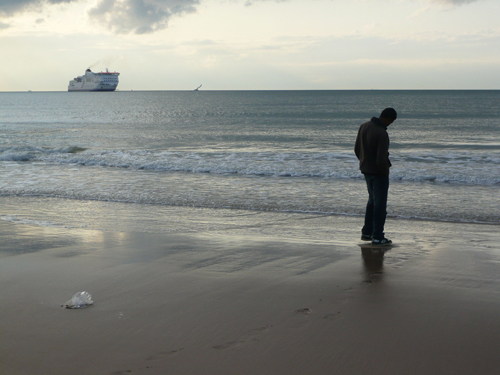
ARTIST IN FOCUS: Sylvain George
In the context of the Courtisane Festival 2011 (Gent, March 30 – April 3 2011)
Sylvain George (1968, Vaulx-en-Velin, France) studied philosophy and worked as a social worker until he turned to filmmaking in 2004. His work, influenced greatly by the thinking of Walter Benjamin, combines militant commitment with formal experiment. “The idea”, he says, “is to make films that take a stand and assert a political position, and at the same time not to separate content from form; to be formally demanding and to manage to define an own view and grammar as a filmmaker.” Far away from any form of didacticism or dogmatism, his films – from short “contre feux” filmed with a mobile phone to elaborate feature-length documentaries – depict and allegorise the struggles of the “nouveaux damnés”, trapped between the rule and the exception: the stateless, the clandestine, the precarious. His most recent work, the impressive Qu’ils reposent en révolte (des figures de guerre), gives an account of the living conditions of migrants in Calais over a period of three years (2007-2010). “Politically speaking, it is about standing up, contesting these grey zones, these spaces or cracks like Calais standing somewhere between the exception and the rule, beyond the scope of law, where law is suspended, where individuals are deprived, stripped off their most fundamental rights. And that while creating, through some dialectic reversal, the ‘true’ exceptional states. Space-time continuums where beings and things are fully restored to what they were, are, will be, could be or could have been”. Rebellion and emancipation are at the heart of George’s films, which find true politics in the gestures, cries and bodies of those who are within the dominant socio-economical order considered as “surplus”: Included, but not belonging.
——————————————————————————————————————————————————————-
SCREENING-PERFORMANCE
Sylvain George / William Parker
Kunstencentrum Vooruit, Thu 31.03.2011, 20:30
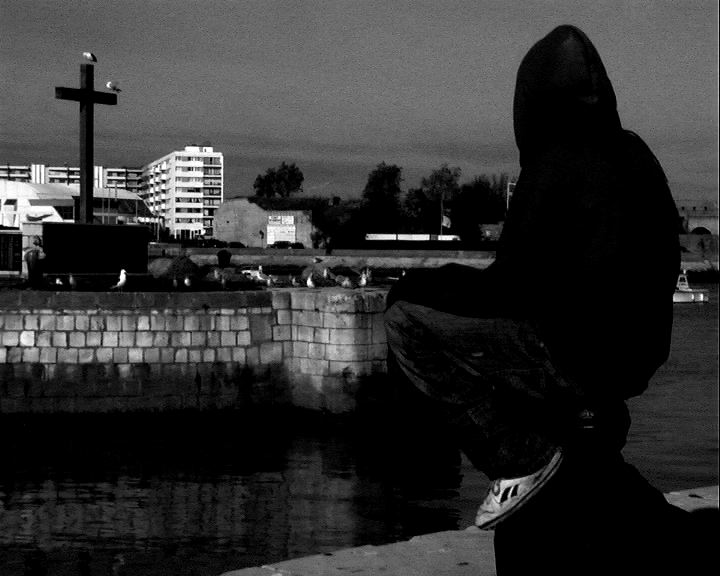
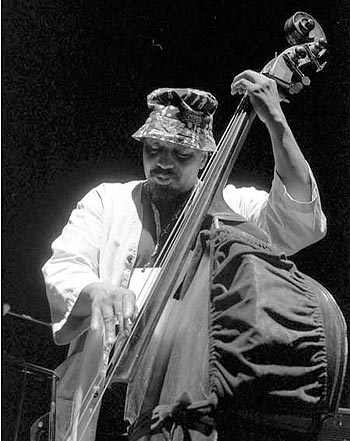
At the occasion of the Courtisane Festival, Sylvain George’s film Qu’ils reposent en révolte (des figures de guerre) will be presented for the first time with a live accompaniment by jazz legend William Parker (1952, New York). Widely acknowledged as one of the most important musicians to emerge from the experimental jazz scene in New York, Parker’s impressive career spans several decades. A master of bass improvisation, he has collaborated with musicians such as Alan Silva, Rashid Ali, Cecil Taylor, Peter Brotzmann, Derek Bailey and Hamid Drake, played in many configurations, led a number of ensembles and composed music for opera, dance and film. Cinema is one of the pillars of his musical vision – he counts among his sources of inspiration avant-garde filmmakers such as Bruce Baillie, Stan Brakhage and Jonas Mekas. He writes in one of his texts : “it is the role of the artist to incite political, social and spiritual revolution. To awaken us from our sleep and never let us forget our obligations as human beings, to light the fire of human compassion”. During this performance Parker will play the bass solo, rooting the musical spaces between bow, fingers and strings, in a dialogue between hearing and seeing, in search for a pure experience of beauty and energy. Or as a spectator to one of his concerts once described “as if his bass were raw wood he was using to light an internal fire”.
Qu’ils reposent en révolte (des figures de guerre)
FR, 2010, b/w, various languages spoken, English subs, 150’
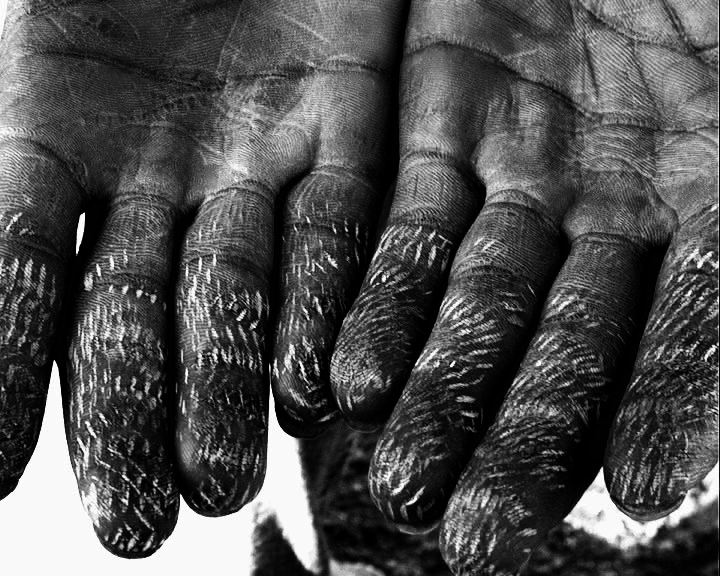
“Composed of fragments that refer back and become mixed up with each other, thus creating multiple games of temporality and spatiality, this film shows the living conditions of migrant persons in Calais over a period of three years (July 2007 to November 2010). In so doing, it shows how the policies engaged by modern police States extend beyond the law, and cause grey areas, cracks, zones of indistinction between the rule and the exception. Individuals (and primarily as enunciation of the ‘defeated,’ pariahs or contemporary plebs: refugees, displaced persons, undocumented immigrants, but also unemployed workers, young people of the poor suburbs…) see themselves thus treated like criminals; they are stripped, divested of the most elementary rights that make of them subjects of law and are reduced to the state of ‘pure bodies,’ or ‘bare lives.’ “ (SG)
——————————————————————————————————————————————————————-
SCREENINGS
FILM-PLATEAU, Sat 02.04.2010
13:00 : SHORT FILMS BY SYLVAIN GEORGE
N’entre pas sans violence
FR, 2007, video, b/w, French spoken, English subs, 20’
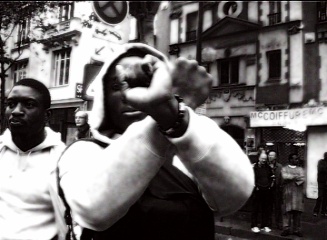
“Rage in the heart. Head-on. The mouth agape. Raids. October 2005. A neighbourhood in Paris revolts, spontaneously. Only the injustice which befalls its inhabitants day after day is equal to the echo of their despair and anger. Historical gestus which recalls the most beautiful, fragile and resistant popular fights: Spartacus’s slaves, the insurgents of the Paris commune, blacks, Latinos… Worlds that are like tighten fists, beating hearts, just as the chests rise up.” (SG)
No Border
FR, 2007, Super 8 to video, b/w, French spoken, English subs, 23’
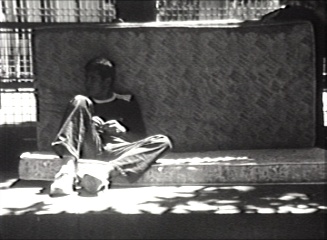
“Paris, open city. Dizziness of commemorations. Ruins. Winds. Tides. Naked eyes. The young migrants – Iraqis, Afghans, Iranians – wander in the streets, between soup kitchens and fortune camps. As they leave, they provoke a crisis of the order of things and bourgeois society. A movement of emancipation arises, profoundly melancholic, elegiac : to redefine the concept of revolution through a new concept of History”. (SG)
Ils nous tueront tous…
FR, 2009, video, b/w, sound, French spoken, English subs, 11’
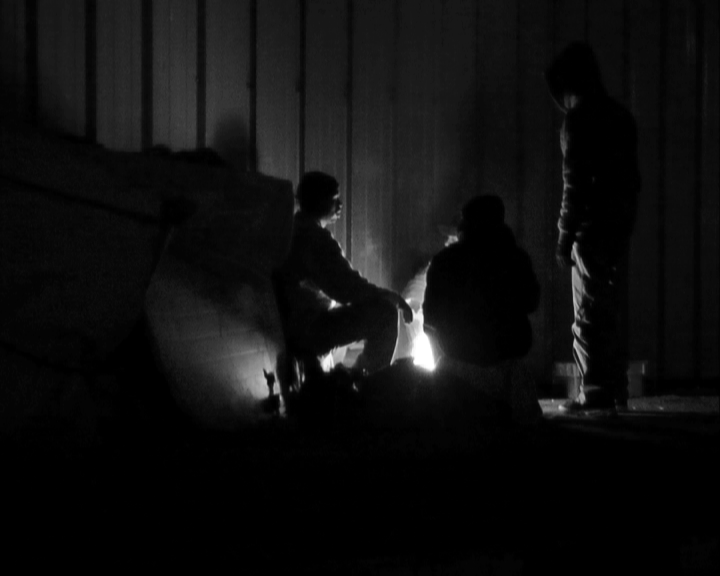
Part of Outrage & Rébellion, a collective film made for Joachim Gatti, a filmmaker who was badly hurt by the policie during a peaceful demonstration in Montreuil in July 2009. “Description in the dark of the night of a raid against migrants near the Calais harbour. Description, in the dark, of a political night. To choose one’s side” (SG)
14:45 : “LES JOURS DE COLERE”
compiled and presented by Sylvain George
“Every epoch dreams the next one”
— Walter Benjamin
“This world is half the devil’s and my own”
— Dylan Thomas
René Vautier
Afrique 50
FR, 1950, 16mm, b/w, French spoken, English subtitles,17′
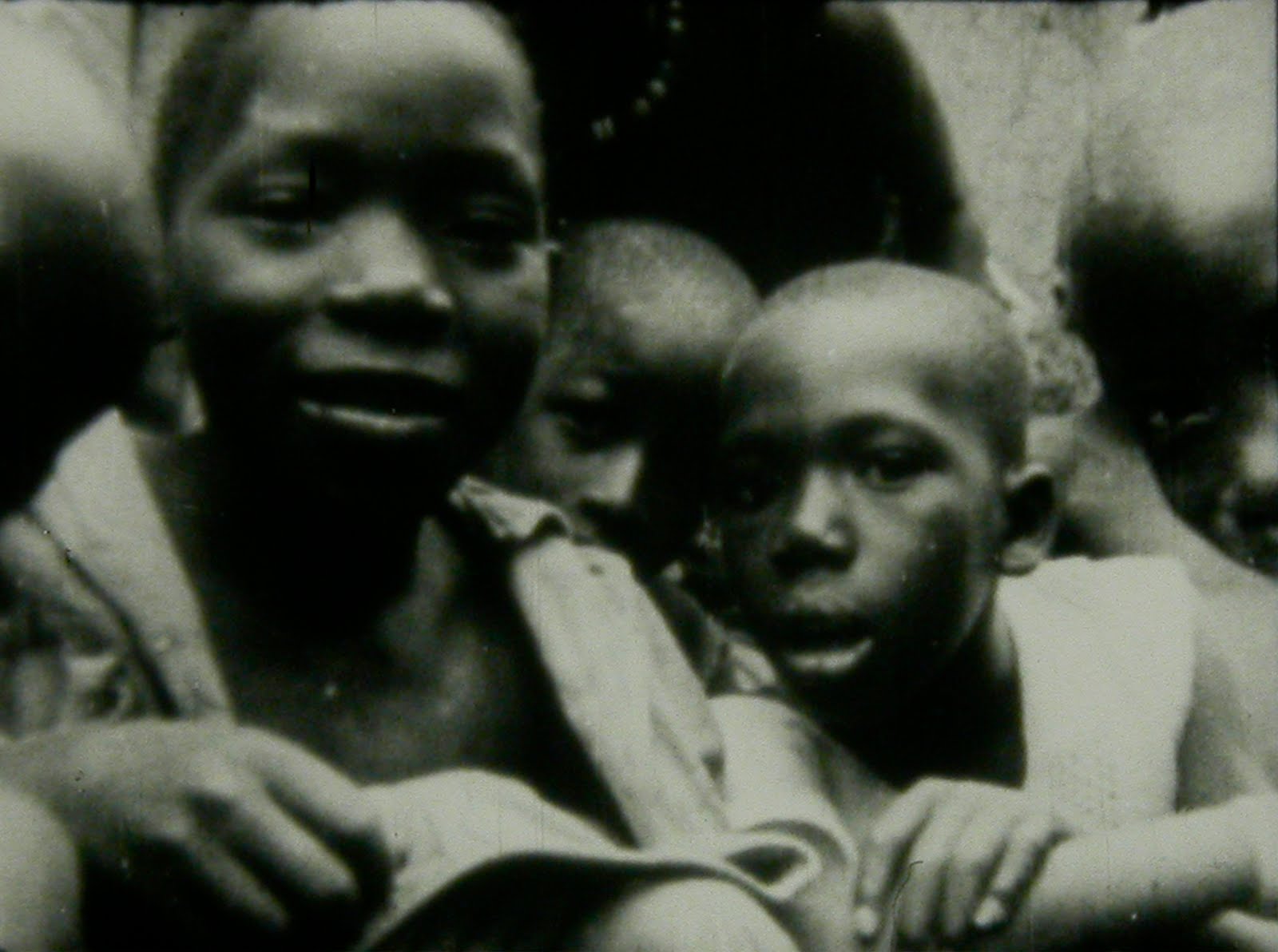
“The Empire is waiting. Get involved in the colony.
Mali, the High Volta, Ivory Coast, Ghana, Burkina Faso… hunting playgrounds for the West, experimental fields for colonial, racial and economical wars. From yesterday to today, and until the revolts – isolated voices, stolen films, collective choirs – burn the arrogance of the powerful, with a roar resonating in History.” (SG)
Manoel de Oliveira
A caça
PT, 1964, 16mm, color, sound, Portugese spoken, French subtitles, 21’
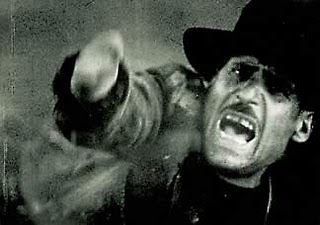
“Have the wolves ever howled ?
On hunting, without fire weapons nor victims, and quicksand as conditions of common living.
Fear, destruction, the “everyone against everyone war”, mythical and dreadful nature, act here as conceptual lures, presenting the world as it doesn’t work: it’s always constructed. Men have to face themselves.
Of a film facing dictatorship.
Of revolution as gesture.”
(SG)
Angela Ricci-Lucchi & Yervant Gianikian
Prigionieri della guerra
IT, 2004, colour & b/w, sound, 71’
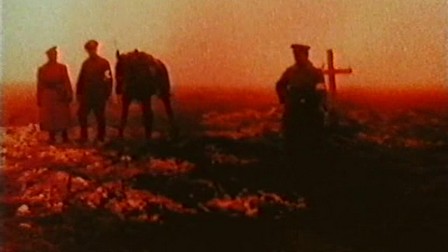
“To resist. On the frontlines.
Soldier-men tracked down, hunted, prisoners, exhibited as trophy, deportations and working camps in Siberia and Austria, cities in ruins, scars, mass graves… Prigionieri della guerra is the first chapter of the “trilogy of war” devoted to the first world war as a “forgotten war”. Or how to wake up from the dream of an “European era” : industralised mass massacres, fascism, control societies, violence inflicted to nature, failure of classical humanism.
On the burning becoming of memory.”
(SG)
16:45 L’IMPOSSIBLE
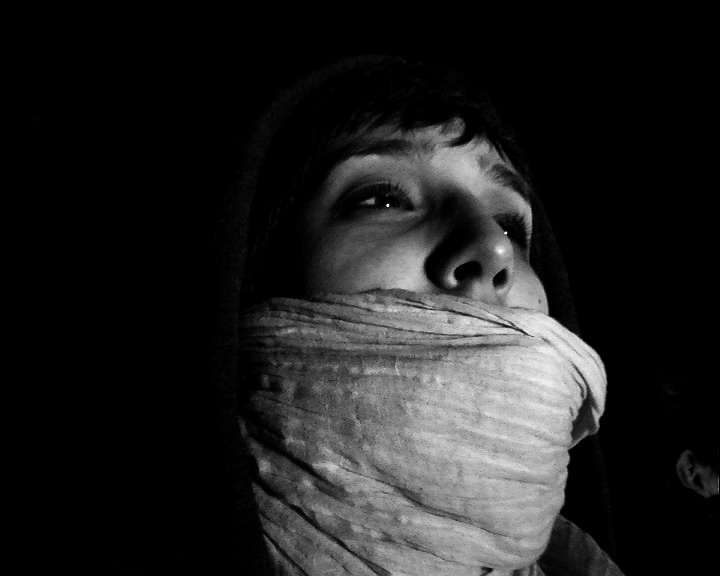
L’Impossible – Pages arrachées
2009, Super 8, DV, 16mm to video, b/w & colour, French spoken, English subs, 135’
A film in five chapters, with titles inspired by figures such as Rimbaud, Lautréamont, Dostoïevski and Benjamin, that oscillates between Calais and Paris, black&white and colour, sound and silence. “To pan wide, to gather food for eye and mind, such is the project. Because Sylvain George, as we have come to understand, perceives his film-making activity as a mission with at least a dual purpose. To claim, on the one hand the avant-gardes’ formal inheritance, drawing on the unbridled vigour of their “logical revolts”. On the other hand, get these manifestations to testify for those who cry out for justice and justly call for shots other than those laid down by prevailing standards. Evocative, though with precise dates and references, silent while at the same time in quest of the most just eloquence, this cinema seeks to bring together both the past and what is as yet unnamed.“ (Jean-Pierre Rehm)
——————————————————————————————————————————————————————-
OPENING NIGHT OF THE FESTIVAL
KASK, Wed 30.03.2011
Amongst others, Sylvain George’s contre feux n° 3 & 4 will be shown, a selection of what he considers “petites formes”, excerpts from a series of intervention films.
Europe année 06 (Fragments Ceuta)
FR, 2006 – 2008, video, French spoken, English subs, 21’
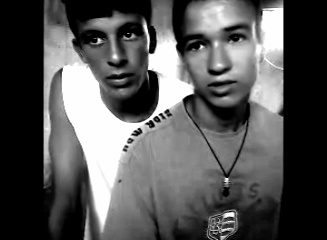
“Rimbaud/Genet/Buñuel/Rossellini/Pasolini… A group of Algerian teenagers survive in an abandoned warehouse in Ceuta, waiting to reach Europe. A certain idea of youth is at stake. Of youth as migration, and of migrations as the spring that occurs every new year. The spring or the awakening of sexes as would say Pasolini, the art of encounter and a vagabond heart, forcing Europe and the established order to reflect on what they are: old (Postures of withdrawal. Self preservation. Fear). You will never be able to escape them anymore.” (SG)
Un homme idéal (Fragments K.)
FR, 2006 – 2008, video, French spoken, English subs, 12’
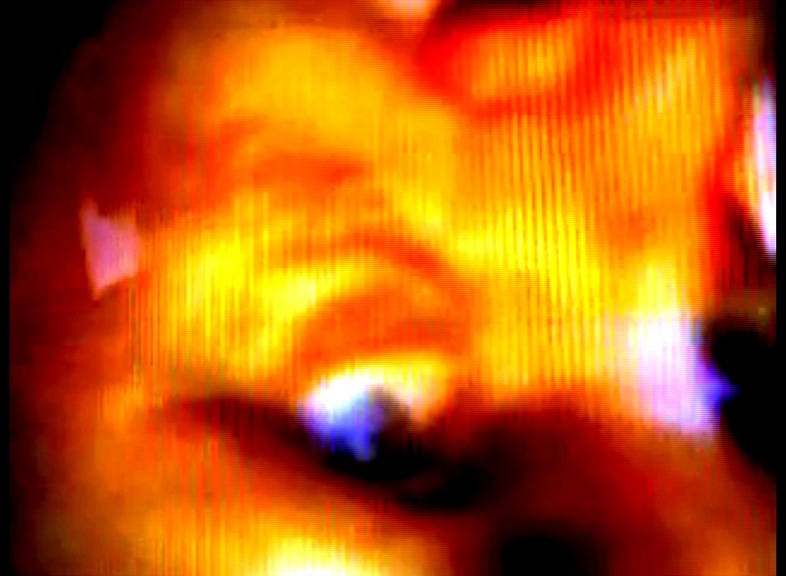
“A man walks in the city. Paris. Mister K. Just like the 30.000 families who have put their last hope in the circular of S., Mr K. waits and waits and waits… And while he waits, we discover a petrified face, that of French society in state of war…” (SG)